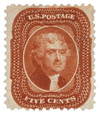
# 42 - 1875 5c Jefferson, orange brown
U.S. #42
1875 Thomas Jefferson
- Reprint of #28 of the Series of 1857-61
- Not valid for postage
- Issued for the 1876 Centennial International Exposition
Stamp Category: Definitive
Value: 5c
Issue Date: 1875
Printed by: Continental Bank Note Co.
Quantity printed: 875
Format: Printed in sheets of 200 divided into two panes of 100
Printing Method: Engraving
Perforations: 12
Color: Orange brown
Paper: White and hard, without gum
Why the stamp was reprinted: The Post Office Department requested the stamp in order to have a complete set of all US stamps to showcase at the first world’s fair – the Centennial International Exposition of 1876, held in Philadelphia. Postal authorities also wanted to be able to fulfill collectors’ and others’ requests for the demonetized issues.
About the printing: The design was engraved on a die – a small, flat piece of steel. The design was copied to a transfer roll – a blank roll of steel. Several impressions or “reliefs” were made on the roll. The reliefs were transferred to the plate – a large, flat piece of steel from which the stamps were printed.
About the design: Thomas Jefferson’s portrait on the #42 is based on a painting by Gilbert Stuart, who also painted many portraits of George Washington.
About the 1875 Reprints: The stamps in this series are reprints of the series of 1857-61. They were not valid as postage because the stamps had been demonetized during the Civil War to keep the South from using them.
Some of the reprints in the series were printed from the original plates (5c, 24c 30c, 90c). Others (1c, 3c, 10c, 12c) whose plates couldn’t be found, had new plates made from the original transfer rolls. Stamps with new plates were printed in single sheets of 100; the others were printed in sheets of 200 divided into two panes of 100.
The 1875 reprints can be easily distinguished from the 1857-61 stamps by their brighter colors and their perforation gauge of 12. The originals were perforated 15½.
On rare occasions, a used reprint surfaces, despite the fact it was never valid for postage.
History the stamp represents: The 5c Jefferson is a reprint of #28, issued in 1857. The stamp was displayed at the 1876 Centennial International Exposition, but was not sold there. It and the other Centennial exposition issues were only available by special order at the Office of the Third Assistant Postmaster in Washington, DC.
Due to its very low issue quantity, the 5c Jefferson reprint is so scarce it’s not offered in Mystic’s U.S. Stamp Catalog.
U.S. #42
1875 Thomas Jefferson
- Reprint of #28 of the Series of 1857-61
- Not valid for postage
- Issued for the 1876 Centennial International Exposition
Stamp Category: Definitive
Value: 5c
Issue Date: 1875
Printed by: Continental Bank Note Co.
Quantity printed: 875
Format: Printed in sheets of 200 divided into two panes of 100
Printing Method: Engraving
Perforations: 12
Color: Orange brown
Paper: White and hard, without gum
Why the stamp was reprinted: The Post Office Department requested the stamp in order to have a complete set of all US stamps to showcase at the first world’s fair – the Centennial International Exposition of 1876, held in Philadelphia. Postal authorities also wanted to be able to fulfill collectors’ and others’ requests for the demonetized issues.
About the printing: The design was engraved on a die – a small, flat piece of steel. The design was copied to a transfer roll – a blank roll of steel. Several impressions or “reliefs” were made on the roll. The reliefs were transferred to the plate – a large, flat piece of steel from which the stamps were printed.
About the design: Thomas Jefferson’s portrait on the #42 is based on a painting by Gilbert Stuart, who also painted many portraits of George Washington.
About the 1875 Reprints: The stamps in this series are reprints of the series of 1857-61. They were not valid as postage because the stamps had been demonetized during the Civil War to keep the South from using them.
Some of the reprints in the series were printed from the original plates (5c, 24c 30c, 90c). Others (1c, 3c, 10c, 12c) whose plates couldn’t be found, had new plates made from the original transfer rolls. Stamps with new plates were printed in single sheets of 100; the others were printed in sheets of 200 divided into two panes of 100.
The 1875 reprints can be easily distinguished from the 1857-61 stamps by their brighter colors and their perforation gauge of 12. The originals were perforated 15½.
On rare occasions, a used reprint surfaces, despite the fact it was never valid for postage.
History the stamp represents: The 5c Jefferson is a reprint of #28, issued in 1857. The stamp was displayed at the 1876 Centennial International Exposition, but was not sold there. It and the other Centennial exposition issues were only available by special order at the Office of the Third Assistant Postmaster in Washington, DC.
Due to its very low issue quantity, the 5c Jefferson reprint is so scarce it’s not offered in Mystic’s U.S. Stamp Catalog.







